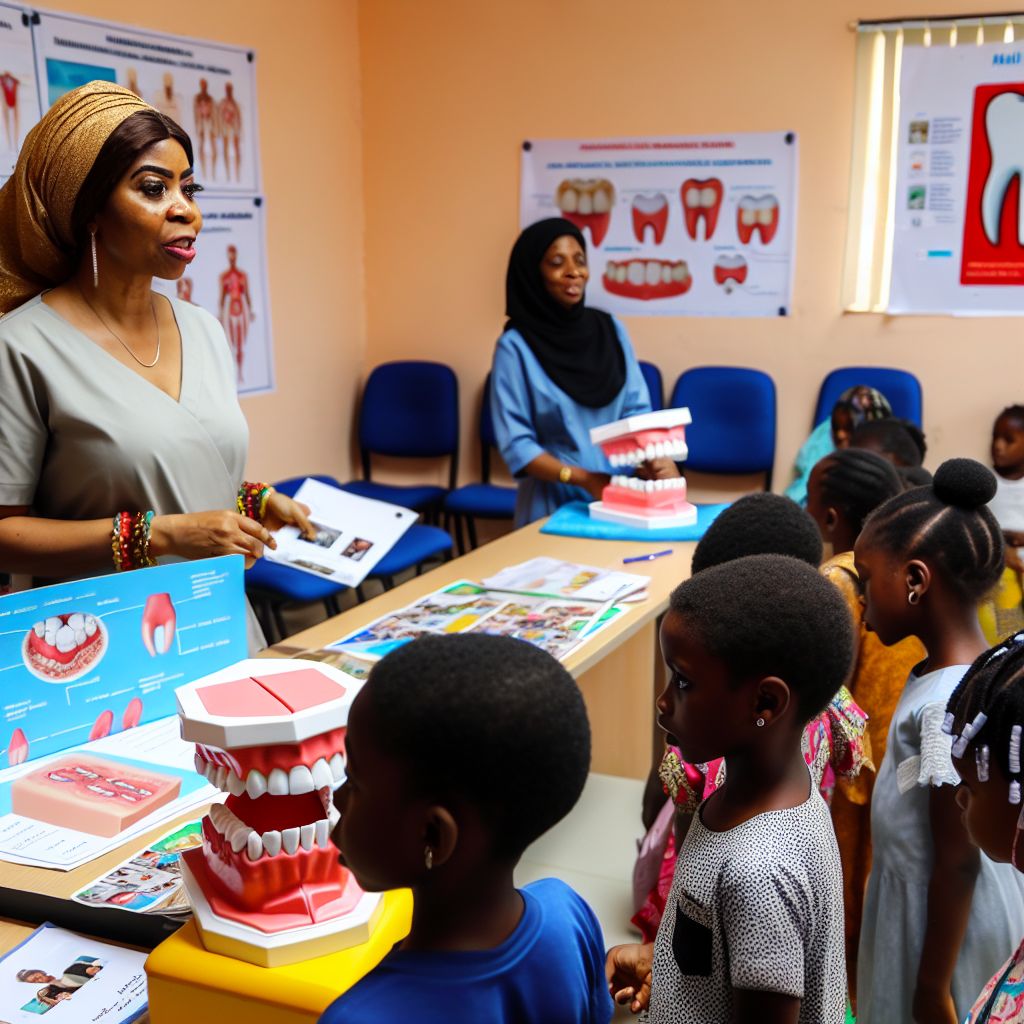Introduction:
Oral health education for kids in Nigeria is crucial for promoting good habits early on.
With the prevalence of oral health issues among children in Nigeria, educating them from a young age is essential.
Overview of Oral Health Education in Nigeria:
Currently, oral health education for kids in Nigeria is lacking.
There are few programs or initiatives aimed at promoting oral health among children.
Improving oral health education in schools and communities is crucial.
Current State of Oral Health Education for Kids in Nigeria:
Many children in Nigeria do not have access to proper oral health education.
Oral health is often overlooked in schools and communities.
There is a lack of awareness about the importance of oral hygiene among children.
Existing Programs and Initiatives:
Some non-profit organizations conduct oral health campaigns in schools.
The government occasionally organizes dental outreach programs for kids.
Community health workers provide basic oral health education in some rural areas.
Need for Improved Oral Health Education:
Children need to learn about proper oral hygiene practices from a young age.
Preventive measures can help reduce the prevalence of oral diseases in children.
By promoting oral health education, the overall well-being of children can be enhanced.
Oral health education for kids in Nigeria is at a critical stage.
There is a need for more comprehensive programs and initiatives aimed at promoting oral health among children.
By improving oral health education in schools and communities, we can ensure that the next generation grows up with good oral hygiene habits and better overall health.
Common Oral Health Issues in Nigerian Kids
When it comes to oral health, children in Nigeria face several common issues that can have a significant impact on their overall well-being.
Identifying these problems early and addressing them through education and preventative measures is crucial for ensuring that Nigerian kids grow up with healthy smiles.
Tooth Decay:
Tooth decay, also known as cavities, is one of the most prevalent oral health issues among Nigerian children.
Poor oral hygiene practices, high sugar diets, and lack of regular dental check-ups contribute to the development of cavities.
Gum Disease:
Gum disease is another common problem that affects Nigerian kids.
It is often caused by poor brushing and flossing habits, leading to inflammation and infection of the gums.
If left untreated, gum disease can progress and result in tooth loss.
Malocclusion:
Malocclusion refers to misalignment of the teeth or jaws.
This condition can be genetic or caused by habits like thumb-sucking or prolonged use of pacifiers.
Malocclusion not only affects the appearance of a child’s smile but can also lead to speech impediments and difficulty chewing.
Impact of Poor Oral Health on Overall Well-being and Academic Performance
It is essential to recognize that oral health is closely linked to overall well-being and academic performance.
Poor oral health in Nigerian children can have profound effects beyond just their smiles.
Pain and Discomfort:
Children experiencing oral health issues such as tooth decay or gum disease may deal with persistent pain and discomfort.
This can affect their ability to eat, sleep, and concentrate in school, ultimately impacting their academic performance.
Low Self-esteem:
Poor oral health can also have a negative impact on a child’s self-esteem and confidence.
Dental problems like cavities or misaligned teeth can lead to embarrassment and reluctance to smile, participate in social activities, or engage in classroom discussions.
Missed School Days:
Children with untreated oral health issues may miss school days due to pain, discomfort, or necessary dental appointments.
This can disrupt their academic progress and social interactions, highlighting the importance of early intervention and prevention.
Importance of Early Intervention and Prevention Strategies
Given the significant impact of poor oral health on Nigerian kids, it is crucial to prioritize early intervention and prevention strategies.
By educating children, parents, and communities about oral hygiene practices and promoting regular dental check-ups, we can help prevent common oral health issues and improve overall well-being.
Education and Awareness:
Teaching children about the importance of brushing and flossing, limiting sugary snacks and drinks, and visiting the dentist regularly can empower them to take charge of their oral health.
Parents and caregivers play a vital role in reinforcing these habits and setting a positive example.
Access to Dental Care:
Improving access to affordable and quality dental care is essential for early intervention and treatment of oral health issues.
Transform Your Career with Expert Guidance
Get personalized mentorship consulting that’s tailored to your unique path. Our expert advice is actionable and exclusive.
Get StartedCommunity programs, school-based dental clinics, and partnerships with healthcare providers can ensure that Nigerian children receive the dental care they need.
Collaboration with Schools:
Schools can play a crucial role in promoting oral health education and providing resources for students to maintain good oral hygiene.
Incorporating oral health lessons into the curriculum, organizing dental check-up days, and partnering with local dentists can support a culture of prevention and wellness.
Learn More: Radiographers’ Contribution to Nigerian Medicine
Strategies for Promoting Oral Health Education:
Teach kids about oral hygiene and healthy habits through interactive games and activities.
Use visual aids like posters, videos, and demonstrations to make learning fun and engaging.
Encourage children to brush their teeth regularly and demonstrate proper brushing techniques.
Emphasize the importance of regular dental check-ups and visits to the dentist for preventive care.
Teach kids about the harmful effects of sugary snacks and drinks on their teeth.
Involve parents in reinforcing good oral hygiene habits at home and setting a good example.
Collaborate with teachers to incorporate oral health education into the school curriculum.
Organize workshops and seminars for healthcare professionals to stay updated on the latest trends in oral health education.
Role of Parents, Teachers, and Healthcare Professionals:
Parents play a crucial role in instilling good oral hygiene habits in children from a young age.
Teachers can reinforce oral health education in the classroom and incorporate it into daily routines.
Healthcare professionals can provide information and resources to educate kids about maintaining good oral health.
Collaboration between parents, teachers, and healthcare professionals is key to promoting oral health education.
Importance of Incorporating Fun and Interactive Activities:
Engaging children in fun and interactive activities can make learning about oral health more enjoyable.
Interactive games, role-playing activities, and hands-on experiments can help children retain information better.
Incorporating fun elements like songs, dance, and art can make oral health education more memorable.
Fun and interactive activities can create a positive attitude towards oral health and encourage good habits.
Children are more likely to retain information when they are engaged in an interactive and entertaining way.
Delve into the Subject: Challenges Facing Anatomical Pathology in Nigeria
Cultural and Socioeconomic Factors:
Cultural beliefs and practices influence children’s oral health behaviors by shaping their perceptions of oral hygiene.
For example, in some Nigerian communities, the use of traditional herbs for oral care is common.
This may result in children neglecting to use conventional toothbrushes and toothpaste.
Additionally, cultural beliefs may discourage regular dental check-ups and preventive care.
Socioeconomic factors play a significant role in access to oral healthcare services in Nigeria.
Families with limited financial resources may struggle to afford dental treatments and medications.
As a result, children from low-income households are at higher risk of developing oral health issues.
Lack of access to oral health resources such as toothbrushes and fluoride toothpaste further exacerbates this problem.
Overcoming Barriers to Oral Health Education:
- Collaborate with community leaders and influencers to promote oral health awareness.
- Organize educational workshops and seminars in local schools and community centers.
- Partner with NGOs and healthcare organizations to provide free or low-cost dental services.
- Train local healthcare workers and volunteers to conduct oral health outreach programs.
- Develop culturally appropriate educational materials and resources on oral hygiene.
- Utilize traditional communication channels such as storytelling and music to disseminate oral health information.
- Empower parents and caregivers to take an active role in promoting their children’s oral health.
- Advocate for policy changes to improve access to affordable oral healthcare services for all Nigerian children.
By addressing cultural and socioeconomic factors and implementing targeted strategies, we can enhance oral health education for kids in diverse communities across Nigeria.
Uncover the Details: Radiology Safety Protocols in Nigerian Clinics

Collaborations and Partnerships:
Collaborations between different entities are essential in ensuring comprehensive oral health education for kids in Nigeria.
By bringing together government agencies, non-governmental organizations (NGOs), and healthcare providers, we can create a more holistic approach to promoting good oral health practices among children.
Successful partnerships that have already made a significant impact in promoting oral health awareness in schools and communities should be highlighted.
By showcasing these success stories, we can inspire others to join in and contribute to the cause.
These partnerships serve as examples of how collaboration can lead to tangible results in improving oral health education for kids.
It is crucial to encourage more stakeholders to actively participate in advancing oral health education initiatives for Nigerian kids.
By spreading awareness about the importance of oral health and the role each stakeholder can play, we can create a united front in addressing oral health issues among children.
Whether it is through funding, resource allocation, or expertise sharing, every contribution is valuable in promoting better oral health outcomes for the younger generation.
Together, we can make a difference in the oral health status of Nigerian children.
- Advocate for collaborations between government agencies, NGOs, and healthcare providers to improve oral health education for children.
- Highlight successful partnerships that have contributed to promoting oral health awareness in schools and communities.
- Encourage more stakeholders to join efforts in advancing oral health education initiatives for Nigerian kids.
See Related Content: How to Prepare for Anatomy Exams in Nigerian Universities
Importance of Oral Health Education in Nigeria
Educating children in Nigeria about oral health is crucial for their overall well-being.
It is essential to teach them about proper dental hygiene practices from a young age.
By prioritizing oral health education, we can prevent dental issues and promote healthier smiles.
Supporting oral health education initiatives for kids in Nigeria can make a significant impact.
Reiterating Importance
Children who receive proper oral health education are more likely to maintain good dental habits.
Investing in their dental health early on can prevent costly treatments in the future.
Oral health education empowers children to take responsibility for their own oral hygiene.
By educating kids about the importance of dental care, we are shaping a healthier future generation.
Encouraging Action
We encourage readers to get involved in oral health education programs in their communities.
Your support can make a difference in promoting good oral hygiene practices among children.
Volunteering or donating to organizations that focus on kids’ oral health education can have a positive impact.
Let’s work together to ensure that every child in Nigeria has access to quality oral health education.
Additional Resources
Dental caries in 12-year-old suburban Nigerian school children – PMC
Oral health behavior of pregnant women in Nigeria: a scoping …




